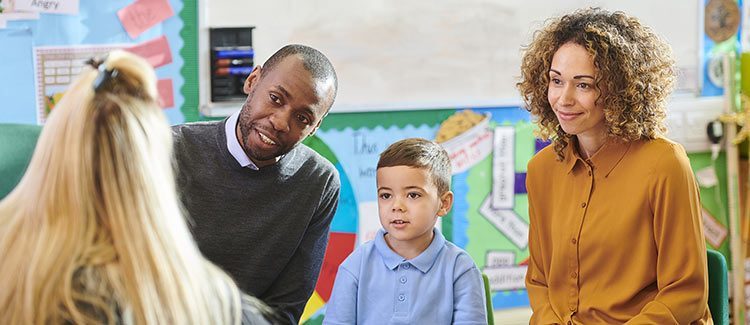The first parent-teacher conference of the school year provides a great opportunity for you and your child’s teacher to share insights and information about him. At this meeting, you can develop a relationship with the teacher and present yourself as a team player in your child’s education. (If your child has a learning disability and receives special education services, it’s essential that you make the most of the conference with the general education teacher.) Because most teachers schedule 30 minutes or less for each conference, planning ahead can help you maximize the experience.
The planning process
You may have met with your child’s teacher when the school year began. By the time the conference rolls around, several weeks will have passed; this means you, your child, and his teacher should all have a better sense of your child’s struggles and strengths. How can you organize your comments and concerns? Here are factors to consider:
Gather information
Ideally, you’ll start preparing during the first few weeks of the school year. What should you pay attention to?
- Ask the teacher to give you information about the planned curriculum, how she assigns and evaluates work, and what her teaching philosophy is.
- Check your child’s school work. What is the teacher assigning? Review your child’s completed and corrected work. Try to do this even if he does homework with a tutor or caregiver.
- Look for patterns in your child’s school work. What subjects (such as math or reading) seem difficult? Are certain tasks (such as writing or computing math problems) more difficult than others? Jot down examples of:
- ongoing (carryover) problems from your child’s previous school years.
- any new struggles you see emerging.
- improvement in areas that used to be difficult.
- Listen to what your child says about his school work, as well as his relationships with his teacher and classmates. Ask him what he thinks are the most important points to cover at the conference. Doing this will help you see things from his perspective. (If your child has a learning disability and has trouble expressing himself clearly, be patient and help him explain both his positive experiences and his struggles.)
- Note any classroom accommodations and techniques previous teachers have used to help your child succeed.
Organize and prioritize
From the list of concerns and observations you create:
- Select the most important points to discuss with the teacher.
- Prioritize your concerns so you’ll be sure to cover the most critical topics before “your time is up” at the conference.
- Summarize your top concerns on paper to take with you to the conference. Try using our “Parent-Teacher Conference Planning” form.
Find out who gives feedback
At least a week before the conference, ask the teacher if feedback from other educators will be included. For example, if your child:
- seems to have problems socializing with adults or students at school, is there a school staff member (counselor or mental health worker) who can give feedback?
- takes classes in art, music, or sports, will those teachers and coaches comment on his skill, talent, and progress in those areas?
- is in special education, how will his special education teacher give his report?
Asking for feedback from several people will help you and the school view your child as a “whole” person with strengths as well as needs.
Get perspective
As the conference date draws near, remember the meeting is an opportunity for you and the teacher to collaborate. Remember that you’re the expert about your child, while the teacher is the expert on teaching kids at his grade level. You’ll both come to the table with ideas and opinions. Remember, too, that collaboration sometimes requires compromise; striking a balance of ideas is often in the best interest of your child.
At the conference
Now, you’re ready to meet with the teacher. Here are some guidelines to keep in mind during the conference:
- Let the teacher “lead” the conference. Be friendly, open, and appreciative of the positive things she does for your child.
- Allow the teacher to express her views, but make sure your priority concerns are addressed. This should be a give-and-take exchange. Hear the teacher out before you make any final requests or suggestions. What she says (new information, insights, or ideas) may alter the approach you take.
- For concerns you and the teacher agree on, ask how you and she can work together. For example, if your child has trouble staying organized, ask the teacher how she plans to help your child. If she offers to create an assignment sheet with due dates for your child to track homework and projects, you can offer to help your child mark his own calendar at home and coach him to check the calendar daily or weekly.
- If you haven’t already done so, ask the teacher how – and how often – the two of you will stay in touch. Will you make contact daily, weekly, or only as needed? Will you communicate by notes, telephone, email, or in person? Making such arrangements sends the message you’re a team player in your child’s education. It also helps you and the teacher plan for two-way communication throughout the school year.
At home after the conference
Whether or not your child attended the conference with you, it’s helpful to sit down with him the same day to discuss what occurred. Depending on his age and maturity level, he may need help understanding what problems – and solutions – were covered. Most kids also want to have a clear idea of what’s expected of the teacher, the parent(s), and, most importantly, from him. Be sure to point out his strengths along with his struggles. “Closing the loop” with your child will assure him that you, the school, and he are on the same team!





